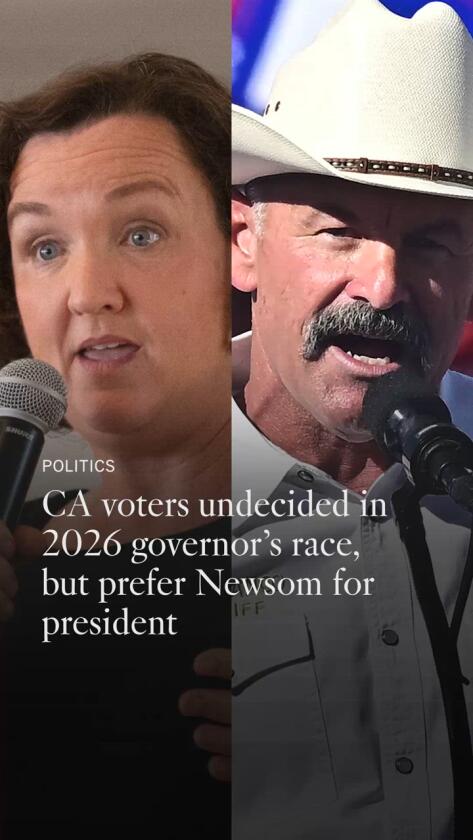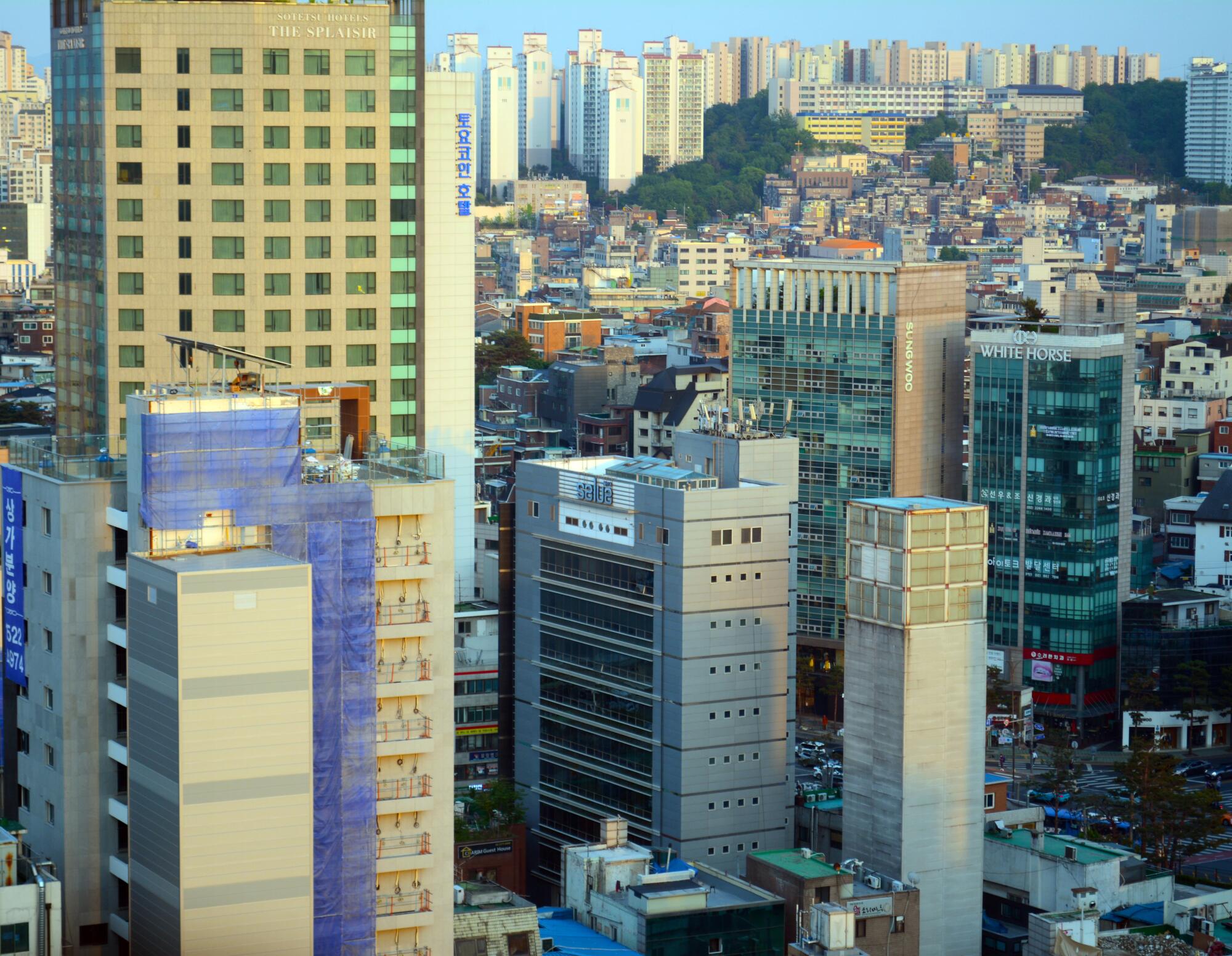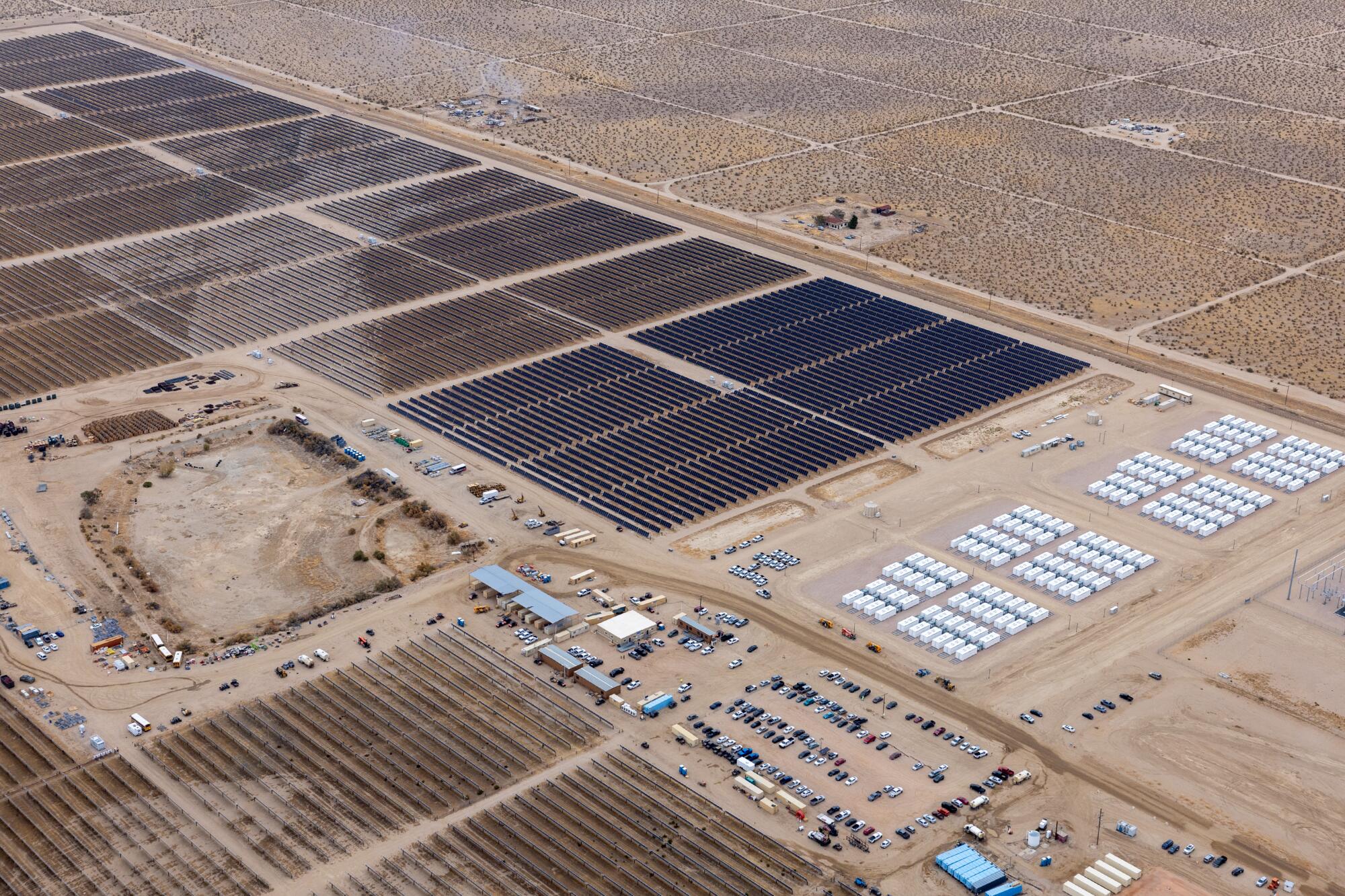Former Vice President Kamala Harris’ decision to forgo a run for California governor has created a wide-open race in next year’s election to run the nation’s most populous state, according to a poll released Tuesday by UC Berkeley and the Los Angeles Times.
Nearly 4 in 10 registered voters surveyed said they are uncertain about whom they will support in the 2026 contest to replace termed-out Gov. Gavin Newsom.
“It’s very unsettled. Most of the voters, the plurality in this poll, are undecided,” said Mark DiCamillo, director of the poll, which was conducted by UC Berkeley’s Institute of Governmental Studies and co-sponsored by The Times. “They don’t really know much about the candidates.”
-
Share via
Among those who had a preference, former Democratic Rep. Katie Porter of Irvine had a small edge as the top choice, with the backing of 17%. Riverside County Sheriff Chad Bianco, a Republican, was the only other candidate who received double-digit support, winning the backing of 10% of respondents.
DiCamillo said Porter’s unsuccessful 2024 U.S. Senate campaign boosted her recognition among California voters, but cautioned that she had a small, early lead more than nine months before the June 2 primary. Bianco’s support was driven by voters focused on crime and public safety, taxes and the budget deficit, perennial concerns among GOP voters, according to the survey.
Other top candidates for governor — former U.S. Health and Human Services Secretary Xavier Becerra, former Los Angeles Mayor Antonio Villaraigosa, former state legislative leader Toni Atkins, current California Supt. of Public Instruction Tony Thurmond, former state Controller Betty Yee, wealthy businessman Stephen Cloobeck and conservative commentator Steve Hilton — received single-digit support as voters’ first choice in the poll. A few potential candidates also had single-digit support, including billionaire Los Angeles businessman Rick Caruso, former Trump administration official Ric Grenell and former GOP state Sen. Brian Dahle.
The survey is among the first independent public polls since Harris announced in late July that she would not run for governor in 2026, dramatically reshuffling the calculus in a crowded race that the former vice president was widely expected to dominate if she mounted a campaign. The poll also took place after Lt. Gov Eleni Kounalakis dropped out of the contest this month to run for state treasurer instead.
“It’s pretty wide-open,” DiCamillo said. “And when you look at the second-choice preference, first and second together, it’s bunched together.”
When voters were asked to rank their top two choices, Porter received 22% as the first or second choice, Becerra got 18%, Bianco notched 15% and Hilton won 12%, according to the poll.
None of the politicians running are well known by Californians compared with the state’s last three governors: Newsom, the former mayor of San Francisco and lieutenant governor, who during his two terms as governor has positioned himself as a foil to President Trump ; former two-term Gov. Jerry Brown, who along with his father left an indelible imprimatur on California’s history; and former Gov. Arnold Schwarzenegger, a global celebrity who returned to the Hollywood limelight after he left office, along with launching efforts to fight climate change and support independent redistricting nationwide.
A pressing question is whether anyone else enters the race, notably Caruso, who has the ability to self-fund a campaign. The deadline to file to run for the seat is March 6.
Whoever is elected as California’s next governor will face the difficult task of contending with a hostile Trump administration and an electorate looking to the state’s next leader to address its most pressing concerns.
Economic issues are top of mind among all registered voters, with 36% saying the cost of living is their greatest concern and 25% focusing on the affordability of housing, according to the poll. But there were sharp partisan disparities about other issues. Democrats were more concerned about the state of democracy, climate change and healthcare, while Republicans prioritized crime, taxes and immigration.
Two of California’s most prominent Democrats, Newsom and Harris, are longtime friends grounded in their Bay Area roots and both viewed as potential 2028 presidential candidates.
As a potential White House hopeful, Newsom has an edge over Harris among Californians overall as well as the state’s Democrats, according to the poll.
Roughly 45% of the state’s registered voters said they were very or somewhat enthusiastic about Newsom running, compared with 36% who expressed a similar sentiment about Harris. Additionally, nearly two-thirds of registered voters and 51% of Democrats said Harris should not run for president again after two unsuccessful White House bids — in the primary in 2020 and in the general election in 2024.
“She lost, which is always a negative when you’re trying to run again,” DiCamillo said. “It’s interesting that even after Harris bowed out of the governor’s race, most Californians don’t really think she should run for president.”
While he described Newsom’s support as a “mixed bag” among the state’s registered voters, DiCamillo pointed to his strength among Democrats. Nearly 7 of 10 registered Democratic voters in the state said they are very or somewhat enthusiastic about Newsom running for president, compared with 54% who expressed similar feelings about Harris.
The poll took place during a tumultuous period as Trump’s far-right policies begin to hit their stride.
Drastic cuts to healthcare, nutrition, reproductive rights and other federal safety-net programs are expected to disproportionately affect Californians. The Trump administration‘s aggressive immigration raids in Los Angeles and across the state and country have caused the nation’s partisan divide to widen, driven by the president’s decision to deploy the military and target all undocumented immigrants, including law-abiding workers. Higher-education institutions across the nation have been targeted by the Trump administration, including UCLA, which is being threatened with a $1-billion fine.
Californians were surveyed shortly before Democratic state lawmakers, trying to fight the Trump administration’s agenda, voted Thursday to call a special election in November to redraw the state’s congressional districts. The action was taken to counter gerrymandering efforts in Texas and other GOP-led states as both parties fight for control of Congress in next year’s midterm elections.
The Berkeley IGS poll surveyed 4,950 California registered voters online in English and Spanish from Aug. 11 to 17. The results are estimated to have a margin of error of 2 percentage points in either direction in the overall sample, and larger numbers for subgroups.



